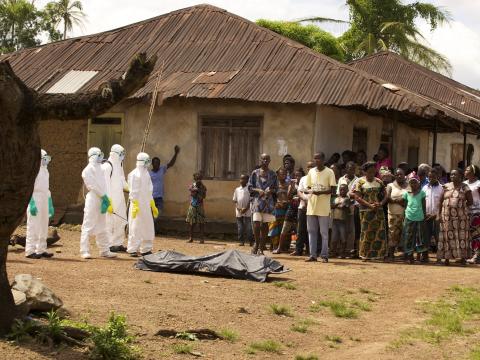BLOG: 32 graves

Bruno Col is World Vision's Regional Communications Director for the West Africa region. He is currently in Sierra Leone helping respond to the health crisis in the country.
BO, Sierra Leone - 7 November 2014
The road to Moyamba is typical of what you imagine when travelling through Sierra Leone. The landscape is made of tall trees with tropical green leaves, thick bushes and forests of palms growing randomly along the banks of small rivers. The heat is humid.
The small town of Moyamba is in the southern part of Sierra Leone, 250 km from the capital Freetown. It is a quiet place with community and health centres, good roads, a few busy markets and people of different faiths living together.
Peaceful Myamba is now in the 'red zone' because of the numbers of Ebola cases confirmed here.
Sadly, Moyamba has become what's known as a 'red zone' because of the numbers of Ebola cases confirmed here since the beginning of the outbreak. The ambulances rushing through the streets and the proximity of a construction site, managed by British troops to build an Ebola isolation centre, are the indicators of life being derailed by the monstrous virus.
We drive to the edge of town to reach the current isolation centre. Several young men and officials are getting ready to put on their personal protective equipment (PPE). The detailed and precise process takes a long time and the burial workers carefully monitor each other to make sure the layers of protective clothing are properly in place. These young men are from the town, they know each other well and have been training for months together to conduct the safe and dignified burial of numerous Ebola victims in the area.
I immediately feel for the burial workers fully covered and spraying each other profusely with the chlorine.
The first thing I notice at the isolation centre was the stench of the chlorine used to spray the PPEs, the shovels, the stretcher and even the car used to transport the victim. I can feel the acidity of the disinfectant on my face, in my eyes and on my lips. The burning feeling, in addition to the heat, is unbearable. I immediately feel for the burial workers fully covered and spraying each other profusely with the chlorine.
Listen as Bruno Col talks about safe and dignified burials here.
The victim we are here to bury arrived several days ago. She was on her own and already seriously affected by Ebola. She was 35 years old with no relatives to pray for her. She will be the last person to be buried today. It is already 5.00 pm and no burial can take place after 6.00 pm - as the sun sets it will be dangerous to supervise the strict security measures needed to perform a safe and dignified burial.
The men in white are slowly moving towards the isolation centre and enter by the furthest part of it which is marked by a thick orange barrier. Health workers have come out to pay their last respects. Others are looking at the scene from afar.
After several minutes, the burial workers come out with the victim; they put her gently but quickly in a body bag, while one of them sprays chlorine over the bag. At this stage, the body is considered safe but the chlorine is sprayed over and over again while they walk at a fast pace towards the pick-up vehicle which will carry her to the burial ground.
The sun is slowly hiding behind a beautiful mass of clouds and the end of the daylight is caressing the landscape. God’s nature is providing the last homage to this woman as we all walk silently behind the car.
She is finally put to rest under the trees.
The light is not going through the leaves any more but our hearts are still with her until the last shovel of soil covers her sick body.
As I leave the ground, I have counted 32 graves, all Ebola victims.
World Vision is working in Sierra Leone to protect children and their families from the devastating impact of Ebola. Our work includes educating communities on how to stop the spread of the virus, providing protective equipment to health and frontline workers and training teams to conduct safe and dignified burials for the victims of the virus. You can donate to our lifesaving work here